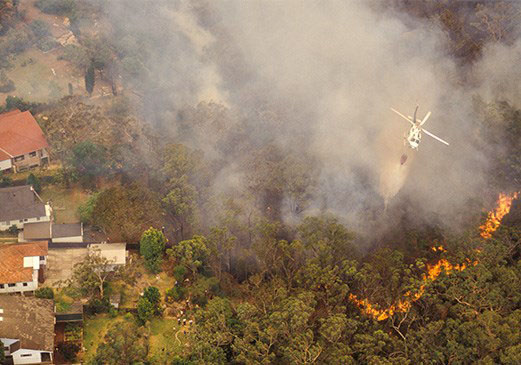9 ways to keep your family safe from wildfires
Each year, thousands of people feel the dangerous effects of wildfires across the country. Though they occur in several types of climates and terrain, wildfires gain strength through a combination of drought and high winds. According to the National Fire Protection Agency, over 140,000 wildfires occur annually in the United States, with the two most common types of wildfires being forest fires and grass/brush fires. These fires often cause damage to homes and property, including propane tanks and appliances.
If your home uses propane, here are nine simple steps you can take to keep your family safe and avoid potential dangers caused by wildfires.
1. Clear at least a 10-foot area around your propane tank and gas grill of any debris. Remove anything that is combustible or easily ignited, including leaves, brush, vegetation, and rags. Make sure the grill and all propane cylinders are at least 10 feet from any structure. Never store, place, or use a propane cylinder indoors or in an enclosed area such as a basement, garage, shed, or tent.
2. Have an adequate supply of propane in your tank. During and after a wildfire, propane and other types of fuel may not be readily available and roads leading to your home or farm might not be accessible for delivery.
3. Create an emergency preparedness plan and review it with everyone in your family. Post a list with contact information for your local Ferrellgas office and emergency services, along with instructions for turning off propane, electricity, and water. If you do need to turn off your propane, contact a service technician to inspect your propane system prior to turning it back on.
4. Prepare a family disaster supply kit with several days’ worth of water and canned foods along with a can opener, extra clothes and blankets, flashlights, and batteries. Include a battery-powered radio so you can stay informed as conditions change.
5. If a wildfire threatens your safety, you should shut off the gas. Turn off the main gas supply valve on your propane tank, if it is safe to do so. To close the valve, turn it to the right (clockwise). Also, it’s a good idea to turn off the gas supply valves located near individual indoor appliances. Consult your local Ferrellgas office to make sure you know where the actual valves are located and how to shut them off. If you have a propane fireplace or log set, close any screen, door, or damper.

6. Listen to your local authorities, or television and radio stations to determine if you need to evacuate your home or farm. If you do evacuate, use extreme caution when returning to your property. If you have any doubts about your safety, leave the area immediately and have your property inspected by a qualified building inspector or structural engineer before re-entering.
7. After the wildfire danger has passed, take the time to carefully evaluate the condition of all the structures on your property. If it is dark, use flashlights, not candles. Look carefully around the entire area. Check for downed power lines; they can create major safety hazards. Inspect your gas lines and tank for damage. Inspect chimneys, flue pipes, and vent connectors for damage, blockage, or debris. Immediately call your local utility company or Ferrellgas if any of these hazards are observed.
8. Schedule a time for a qualified service technician to perform a complete inspection of your propane system if you suspect any of your propane appliances, equipment, or vehicles have been under water or damaged, or you have turned off your gas supply. Never use or operate appliances, equipment, or vehicles, or turn on the gas supply, until your system has been inspected by a qualified service technician.
9. Exercise sound judgment. As with any challenging situation, your composure during wildfires will ensure that you don’t take unnecessary risks or pose any additional dangers to your family and home. Stay calm; use radios, television, and telephones to stay informed and connected. Remember, wildfires can last several days and roads may be inaccessible for fuel delivery or emergency services. If any questions arise, contact your local Ferrellgas office or fire department.
To stay prepared in the event of a wildfire, visit the Propane Education & Research Council’s Custom Wildfire Module Center.
Information in this blog provided by the Propane Education & Research Council.
CATEGORIES
Archives
- Summer 2025
- Spring 2025
- Winter 2024
- Fall 2024
- Summer 2024
- Spring 2024
- Winter 2023
- Fall 2023
- Summer 2023
- Spring 2023
- Winter 2022
- Fall 2022
- Summer 2022
- Spring 2022
- Winter 2021
- Fall 2021
- Summer 2021
- Spring 2021
- Winter 2020
- Fall 2020
- Summer 2020
- Spring 2020
- Winter 2019
- Fall 2019
- Summer 2019
- Spring 2019
- Winter 2018
- Fall 2018
- Summer 2018
- Spring 2018
- Winter 2017
